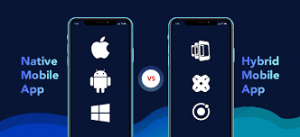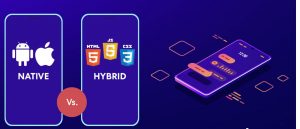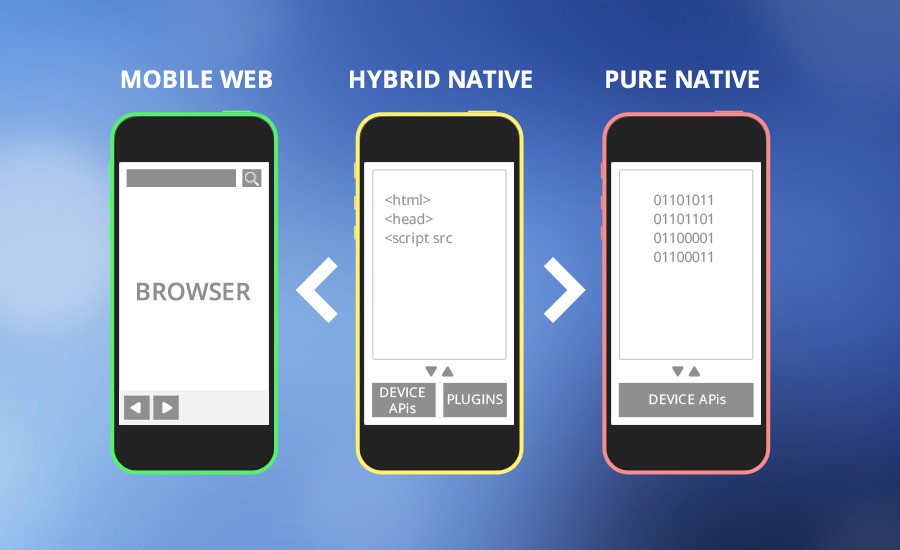Hybrid apps are similar to hybrid cars; these apps combine innovative new technologies with older technologies (HTML, CSS, JavaScript) to generate new apps. Building mobile apps for business purposes and user expectations is important. Both native and web-based apps also have many benefits, but hybrid mobile apps collected hybrid appsthe most popularity providing consistent performance that adapts several platforms to construct applications.
This article mentioned some of the important facts about the hybrid app that one should know.
What Are Mobile Hybrid Apps?
Hybrid mobile apps can be installed in mobile like any other application. However, as Hybrid apps possess elements from native apps, this fact makes them different from native apps. For example, the deployed native container uses Web View object in Hybrid apps.
The adapted web pages from the web-view display are shown in those apps. Hybrid applications combine both native apps and web application elements. It is very popular as it allows users to write mobile apps code once. However, since hybrid apps create an additional layer between the target platform and the source code, apps’ performance may be slower than native apps.
Advantage Of Hybrid Apps
Hybrid apps have many positive aspects. Here are some of the advantages
Ease Development At A Low Cost
In hybrid apps, you have no need to worry form multiple versions in the case of businesses. Instead, it allows users to write and preserve only one version on various platforms.
Meet Target Audience With Creative Ideas
Ordinary applications fail to emulate many ordinary native apps as they are not smart as today’s app. But hybrid apps can do this.
High Speed
The speed and performance of native apps are standard, but in apps, the speed and performance are faster than other mobile development options.

Limitations Of Hybrid Apps
There are few limitations of hybrid apps; those are mentioned below.
- The feeling of native apps is not experienced in apps. There is no seamless user interface. The web view doesn’t allow the exploitation of the full potential of the device.
- When one wants to shift to the next page, it will take a long time to go to the next page, and because of this, it kills the user’s interest.
- The browser’s speed dominate hybrid apps. If the browser’s speed is slow, it will also reduce the performance of the app.
- Developers wish to exploit in each platform, iOS or Android, they have unique capabilities. But in the case of apps, a combination of definite plugins and codes of the platform is used.
Which One Is The Better Hybrid App Or Native App
Hybrid apps vs native apps both have their own pros and cons; one should analyze carefully which is the best option for them. For example, if one needs a stable type of app and has good performance, then the native app is a better option. On the other side, the camera, calendar, GPS, etc., of other mobile phones integrated with native apps easily.
But if someone is looking for an app that develops in the shortest period, then they should go for a hybrid app. This is because hybrid apps are also good for multiple purposes at one developed app. And it also concludes the whole business in just one go which is a better thing to do for beating competitors. So for them, the app is the best option.
Situations In Which Hybrid Apps Are Best
Here we mentioned three situations in which one should obviously go for a hybrid app.
When One Doesn’t Need The Best User Experience
There ta a compromise in the user’s experience of hybrid apps. On the part of HTML5 developers, it takes a great deal of extra work to produce a platform, along with the shortage of user experience due to native UI.
When One Doesn’t Want To Generate Rich Media Apps
For making animation or graphics-intensive apps like rich-media or interactive games, hybrid apps are never considered to be the right one. Those apps require good user interactions.
Speed Is Not Necessary.
If someone needs a one-star rating in the apps store, then they should not go for hybr6apps. The speed and user experience have a huge difference between hybrid apps vs native apps; it is pretty slow in apps and creates the additional layer between the app and the user.

Popular Tools Required While Making Hybrid Apps
The best tools for hybrid app development are mentioned here
React Native
This provides native modules and is based on React and JavaScript. For developers, this is the hybrid app framework.
Flutter
This platform accommodates many operating systems and various programming languages. Therefore, it is valuable for speed and lots of features provided by this platform.
Ionic
This free and open-source framework is the most popular tool for manufacturing hybrid apps. The community of developers is pretty large.
Xamarier
This platform provides performance and user experience close to native and is compatible with different platforms. In addition, this cross-platform utilizes the language of C programming.
Phone Gap
It converts a single codebase into an app within minutes written by developers using popular programming languages such as CSS, HTML, and JavaScript.
Conclusion
The hybrid apps vs native apps both are important to target a huge amount of user’s interference, the native apps are the best option, and for operating multiple platforms at one go, the apps are the best. These apps are very useful for business purposes. Native apps are still the better choice for developing complex and advanced applications, and the apps are chosen for beginners as it is easy to use. Both hybrid and native apps have their own pros and cons.
Know more about Cloud Technology Partners: https://www.celltophone.com/2021/06/29/cloud-technology-partners/

